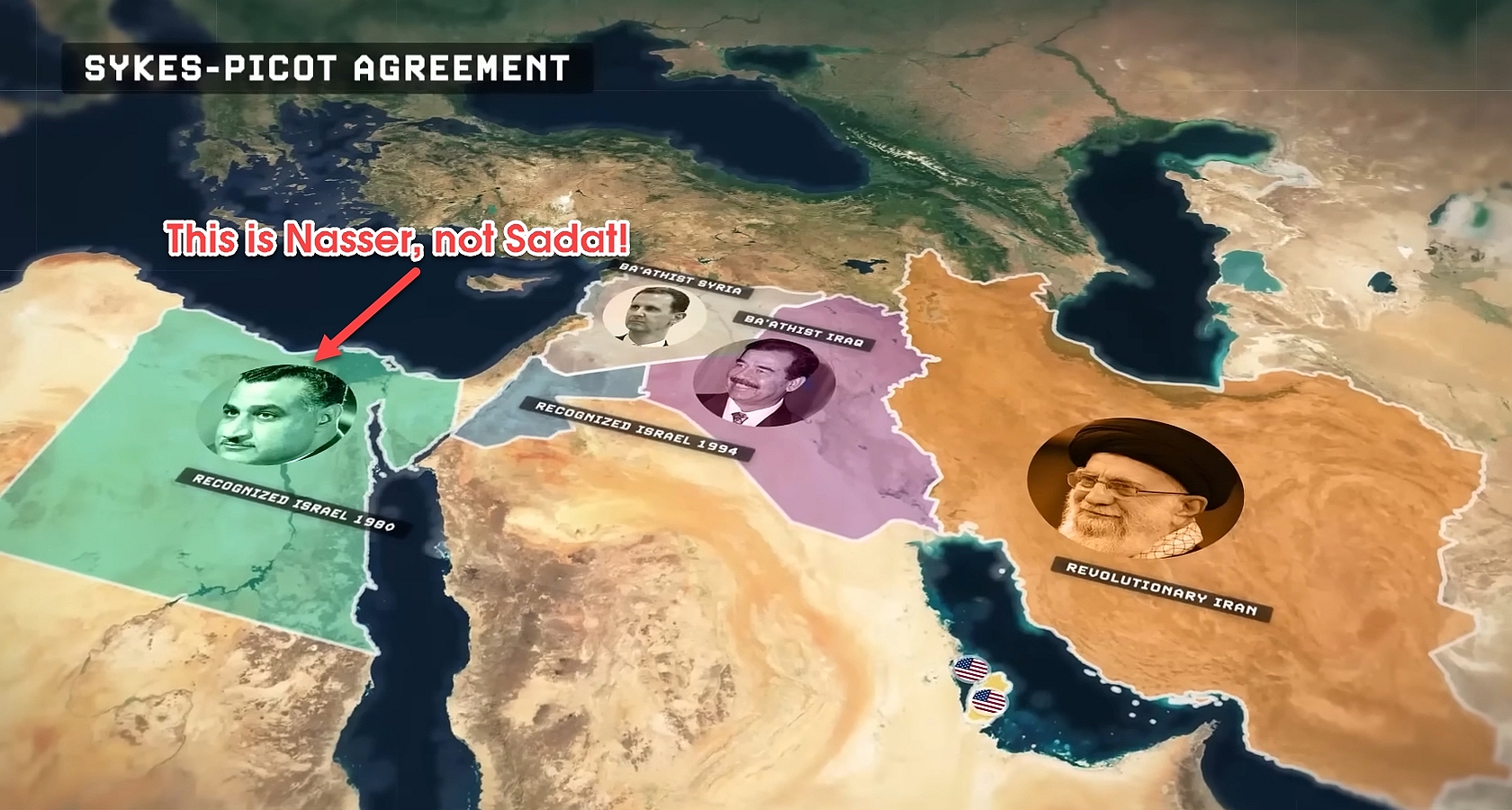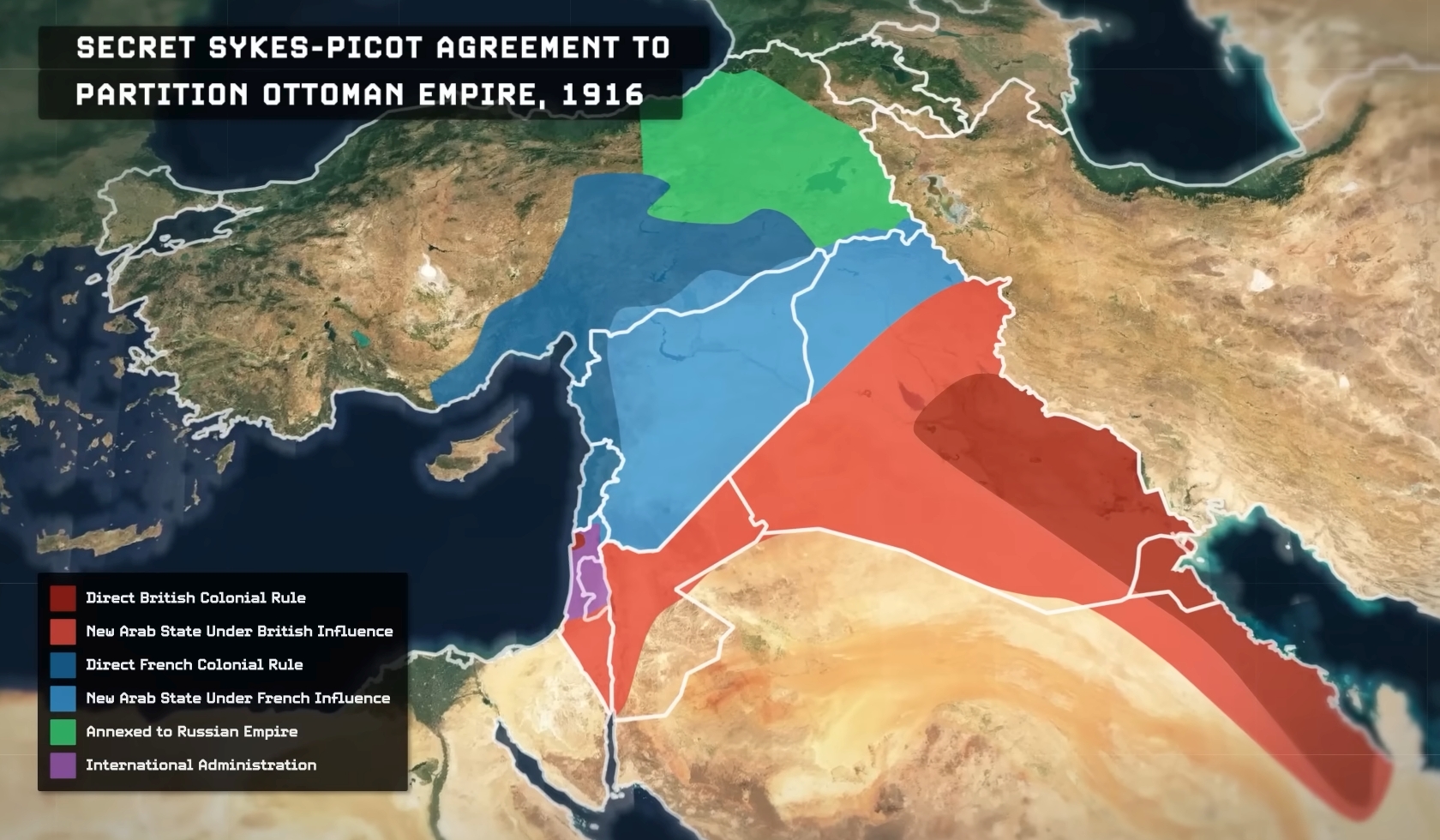Middle East’s Borders Led to Wars
![]() Funny thing (if there are still things that can be funny these days), I just ran over a YouTube video posted on June 18, “Why the Middle East’s Borders Guarantee Forever Wars”—and it ain’t a bad one! I’m not a fan of the RealLifeLore channel (with extra contents about Modern Conflicts on Nebula), because some of its titles are grotesque (Why Iran is Also Attacking Ukraine Now; Why North Korea is Preparing to Attack Ukraine Next) or purely speculative (How Taiwan Will Stop China’s Invasion), but the video I’m talking about presents a rather accurate history of the sequence of events that led to the never-ending wars in the Middle East.
Funny thing (if there are still things that can be funny these days), I just ran over a YouTube video posted on June 18, “Why the Middle East’s Borders Guarantee Forever Wars”—and it ain’t a bad one! I’m not a fan of the RealLifeLore channel (with extra contents about Modern Conflicts on Nebula), because some of its titles are grotesque (Why Iran is Also Attacking Ukraine Now; Why North Korea is Preparing to Attack Ukraine Next) or purely speculative (How Taiwan Will Stop China’s Invasion), but the video I’m talking about presents a rather accurate history of the sequence of events that led to the never-ending wars in the Middle East.
You might want to watch it full-screen.
Now, for sure, there are a few annoying aspects of this documentary. For one, this gay can’t pronounce correctly any name that isn’t English. Then, there are a number of inaccuracies, at least at the level of the animated maps, such as this one:

I hope this map is reasonably correct, though (there is also this “official” map on Wikipedia):

The proposed theory
What this video says, in a nutshell, is that everything started with the Sykes–Picot Agreement (1916), which ignored the ethnic and religious composition of the territories in the region. Notwithstanding the faults of the colonialism in the region, the partitioning agreements that started with Sykes-Picot were the main culprit. The Treaty of Sèvres (1920), with an atrocious pronunciation, and the Treaty of Lausanne (1923) were only two of the senseless agreements that cemented the incessant row of conflicts in the Middle East.
The video goes into a good deal of historical detail, so I’d really recommend it as a primer about the Middle East. If I were to simplify the root cause of the conflict in Israel, I’d rather insist on the Balfour Declaration (1917), which practically made the United Kingdom the guarantor of the Basel Program (1897). I’m not saying that this is the bad thing, but it puts the entire responsibility on British shoulders.
Further reading
Since one has to start with the beginning, it wouldn’t hurt to watch again Lawrence of Arabia (1962). Then, it would be a good idea to read:
- James Barr’s A Line in the Sand; here’s a decent summary (with quotations). Another review here.
- Neil Faulkner’s Lawrence of Arabia’s War; for this one, have a shorter presentation.
- James Barr’s Setting the Desert on Fire, with US and UK editions and reprints from 2006 to 2019.
- James Barr’s Lords of the Desert.

In lieu of a conclusion
As superficial as the above video recap of the history is, once you add to it the memories of the previous wars, as reported by the media (I grew up listening every single day at the radio about the Lebanese Civil War), it can only make you pessimistic with regard to a durable peace in the Middle East.

From a distant past:
■ 2022-12-05: Jordan B. Peterson with Benjamin Netanyahu: Does Israel have the right to exist? (full Episode 311)
■ 2023-03-27: Piers Morgan vs Benjamin Netanyahu | FULL Interview With Israeli Prime Minister
An interesting detail:
■ 2022-02-25: Discrimination against Jews and Christians in Jerusalem (Ascending the Temple Mount)
Jews, Christians and basically any people who are not Muslims are being discriminated against in Jerusalem and yet nobody is talking about it. This is specifically about the Temple Mount. Non-Muslims are only permitted to enter through the Moroccan (or Magharibah) gate, while Muslims can use nine gates. BUT HOW DOES ONE PROVE THAT HE’S MUSLIM?
Indeed, the official rules say (as per any Israeli tourism website): “Visitors may not bring in any sacred Jewish objects, such as a prayer book or a tallit.” Also, “While the complex is open for all to see and a great addition to your Israel itinerary, non-Muslims are NOT permitted to enter inside of the Dome of the Rock.”
An official Israeli website: “Non-Muslims (Israelis and tourists) are allowed to visit the Temple Mount at fixed times, but do not enter the al-Aqsa Mosque itself: they are visiting other parts of the site and usually walk around the large open spaces. In addition, Jews and other non-Muslims are not permitted to pray on the Temple Mount.”